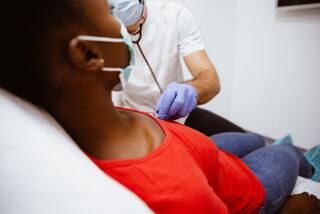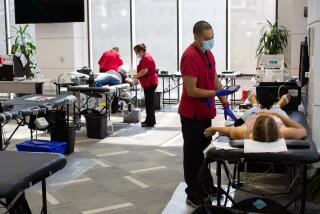Physicians’ Bias Thwarts AIDS Prevention
- Share via
Because of recent major advances in AIDS prevention, physicians’ involvement in the epidemic is more critical than ever, yet it is not occurring. A major barrier is prejudice. Reducing prejudice, or at least changing physician behavior, is a challenge that the profession’s leadership must take.
The physician’s role in AIDS prevention today involves taking a sexual and drug-use history from all patients and encouraging people with past or present high-risk behavior to take the HIV antibody test. Those who test positive need evaluation of their immune systems, and if impaired, will need AZT and possibly other medications to prevent or delay disease. However, the initial step--taking the patient’s sexual and drug-use history--is not being done. The reason appears to be physician prejudice against homosexual/bisexual men and an aversion to AIDS.
Physician bias against a wide range of patients has been known to the profession’s leadership for years and even documented, yet no major effort has been made to change those attitudes. In a survey of physicians in Michigan and Australia published in 1982, negative stereotypes were found about alcohol abusers, unhygienic patients, angry patients, drug abusers, obese patients and patients with minor mental disorders. The authors advised intervention during medical school if the behaviors that flow from negative stereotypes are to be changed. They did not address changing the behavior of physicians in private practice.
A third-year medical student, Hannah Brooks, wrote in a medical honors society journal in 1987, “Physicians also become angry with patients whose problems they perceive (with or without justification) as being self-inflicted.” This is, of course, a major problem with AIDS, as well as other conditions.
Also published in 1987 was a study of medical students’ attitudes toward AIDS and homosexual patients. It showed that “medical students view AIDS patients in a highly negative manner, as they do homosexual patients regardless of their illness.”
The authors said that developing ways to counter such attitudes “is a topic that merits the attention of medical educators.”
This year, the Assn. of American Medical Colleges recommended that faculty members help medical students and residents understand and accept personal risk in the practice of medicine, overcome their biases and prejudices and learn to cope with the emotional demands of certain types of patient care. (They did not indicate who would help change the attitudes of faculty members.)
Because physicians are people first, they have the same prejudices as any other group; ours is a racist, sexist, ageist, homophobic society. We may not be able to dramatically change that. But when biases threaten peoples’ lives--and they do when physicians shun AIDS prevention--then medical leaders must address the issue. This has not yet happened.
Prejudice can cause harm, directly or indirectly; it influences what a physician does or, just as important, does not do. Numerous medical organizations have advised physicians that they have an obligation to AIDS prevention that starts with including sexual behavior and drug use in taking a patient’s history. Yet in a poll reported at the fifth International AIDS Conference this summer, less than 4% of the respondents had discussed sexual behavior related to AIDS with their physicians; most said they wanted such a discussion but were waiting for the physician to initiate it.
So how can this change? There are no easy answers. But first the medical profession’s leaders must acknowledge that there is a problem. While they have little leverage over individual physicians, they can take realistic steps toward improving the medical community’s awareness and engaging its cooperation.
For an example of what this can achieve, the experience of San Francisco in the early 1980s is persuasive: Through a concerted educational program on the hazards of AIDS, virtually all of the gay male community changed its concept of acceptable sexual behavior.
Countless people would benefit if physicians would change the attitude they have toward many diseases, so that, in the case of AIDS, for example, taking a drug use and sexual history is as common as a blood-pressure check.
The Hippocratic Oath requires that physicians “exercise (their) art . . . for the prevention of disease.” People--all people, not just those at risk for AIDS--have the right to expect that this oath is being observed for the sake of public health--the health of all.






